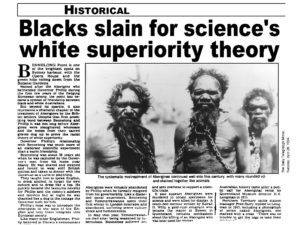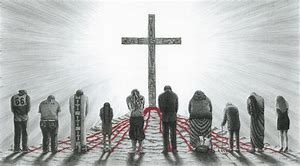In a country with such a racially-charged history, very little discussion of contentious issues can go on without someone bringing up racism as a motive. Racism is by no means something that died with apartheid, nor is it something that one ‘race’ has the monopoly on. How should Christians think of ‘racism’?
Historical Background of the Idea of Race
The current idea of races is not a biblical one. Darwinism lies behind the idea that humans developed (evolved) at different paces, some reaching a more civilised state earlier than others. This in line with Darwin’s theory, the full title of his book being “ On the Origin of Species by Means of Natural Selection, or the Preservation of Favoured  Races in the Struggle for Life”. After an encounter with “savages” in Tierra del Fuego, Darwin exclaimed in his diary “one can hardly make oneself believe that they are fellow creatures”, he observed in The Descent of Man that “the civilised races of man will almost certainly exterminate, and replace, the savage races throughout the world”.
Races in the Struggle for Life”. After an encounter with “savages” in Tierra del Fuego, Darwin exclaimed in his diary “one can hardly make oneself believe that they are fellow creatures”, he observed in The Descent of Man that “the civilised races of man will almost certainly exterminate, and replace, the savage races throughout the world”.
Social Darwinism, while rejected by contemporary proponents of scientific Darwinism, was nevertheless the logical application of Darwin’s theory to mankind. Certain environments had created certain biological adaptation in men (accounting for skin colour differences, difference sin stature), but also in mental and emotional development.
Eugenics was one result of this: believing that it was necessary to sterilise the ‘unfit’ and to hasten the creation of a super-race. Over 65 000 people in America were sterilised. After WW2, it waned in popularity, but modern super-hero movies, films about super-abilities appearing in people, and the possibility of DNA editing shows that this has never died.
Nazism was a logical application of Darwinism. Hitler believed that he was co-operating with nature by slaughtering Jews, Gypsies, Poles, Slavs, the disabled and other dissenters. Eleven million people were slaughtered in the pursuit of a Master Race.
Apartheid grew up in the same soil. Darwinism was accepted as fact in the 1940s. Alongside 100 years of exhausting wars between British, Afrikaner, Zulu and Sotho, the disintegration of the British Empire, a growing Afrikaner Nationalism and Protectionism, the idea of ‘separate development’ along racial lines would create a system of inequality and active discrimination.
While today the world decries racism as evil, it uses the same genetic and evolutionary thinking. Using this, it defends homosexuality as being equally biologically determined, making racism and homophobia the same form of mindless hatred for ‘differences’. Only the Bible has the true antidote for racism.
The Biblical View of Race
1. Scripture is clear that man was made in God’s image (Gen 1:26-28). All men are descended from Adam, which means that all men share equally in God’s image.
2. In Acts 17:26, Paul makes it clear that God has made every nation (‘ethnos’) from one blood. Put simply, there is only one race on Earth – the human race. We are one race, divided into different nations – ethnicities, or language groups.
3. The origin of different ‘nations’ is given in Genesis 11.  There we read that man as originally one ethnicity – speaking only one language. Man’s pride led to the Tower of Babel, where God supernaturally created multiple ethnicities in one day.
There we read that man as originally one ethnicity – speaking only one language. Man’s pride led to the Tower of Babel, where God supernaturally created multiple ethnicities in one day.
4. The following ‘table of nations’ details how all mankind come from the three sons of Noah: Shem, Ham, and Japheth. Although we cannot be precise, it appears that the split may have been: Ham: African and Oriental Peoples (Including American Indians and South-Sea Islanders); Japheth: Indo-European Peoples; Shem: Semitic Peoples of North Africa, MiddleEast and Central Asia. Whether God changed people’s physical appearance at Babel, or whether physical traits developed in response to various climates is not certain.
5. What Scripture describes is a broad ‘devolution’ as most tribes deepened in their idolatry, dehumanising themselves by their idolatries (Rom 1:18-32).
6. At the root of what is now called ‘racism’ is the evil heart of pride. Man’s love of self, causes him to hate those around him, beginning at the broadest level of differing ethnicities, but circling in to others from different regions, cities, towns, families. Racism seeks the excuse of difference to war, subjugate, enslave and steal from one’s neighbour to enrich and exalt self.
7. Israel was a called-out ethnos, a nation meant to be a light to other nations. Intermarriage was not forbidden on ethnic lines, but on religious ones. Israel was not to lose its separateness from the nations. If a man or woman from another nation embraced Israel’s God, marriage was permissible. This is still the case (1 Cor 7:39).
8. At the same time, Israel was to show hospitality and kindness to people form other nations who had not converted (Lev 19:34).
9. Unfortunately, by Christ’s time, many Jews had confused ethnicity with God’s favour, and despised Gentiles for being Gentiles (Lk 4:23-29, Acts 22:1-22).
10. Christ told parables such as the Good Samaritan to confront the racial hatred that was now present in Israel.
The Cross and Race
1. The ultimate answer to hatred, jealousy and division between mankind is the Cross. The Cross removes all grounds for boasting, and humbles every ethinicity. It then creates a new ethnos – literally a new race/ humanity in Christ, so that two believers from different ethnicities now have a new one in Christ (Eph 2:11-19, Col 3:11, Gal 3:28)
to hatred, jealousy and division between mankind is the Cross. The Cross removes all grounds for boasting, and humbles every ethinicity. It then creates a new ethnos – literally a new race/ humanity in Christ, so that two believers from different ethnicities now have a new one in Christ (Eph 2:11-19, Col 3:11, Gal 3:28)
2. The Great Commission is a message for every nation to reach every other nation (Mt 28:19-20).
3. Understand the great glory of God’s final plan includes a great conglomeration of ethnicities redeemed and singing the same song (Rev 5:9, 7:9-10)
4. The Church is not Israel, because the church does not call on Gentiles to become Jews. Gentiles can come to Christ as they are. This was a huge hurdle for saved Jews in the book of Acts.
5. The meaning of the gift of tongues was to both rebuke Israel for their ethno-centrism, and to show unbelieving Gentiles that the Gospel was for them too (1 Cor 14:21-22).
6. Believers now have the God-given position to embrace other ethnicities as family, and are commanded to do just that.
7. Partiality – which is preferring one believer over another – is forbidden in Scripture (James 2:1-9). Hospitality to all in Christ is what is required.
8. Understanding that certain traits are present in cultures (Tit 1:12), should give us compassion and understanding. Some traits will change with exposure to the Gospel. Some traits will add colour and pleasurable diversity to the church.
9. We must work to overcome historically imposed divisions  by going outside of our comfort zone to enter the lives of believers from different ethnicities. Show genuine interest, and it will help you understand the other. Accept that those who have experienced injustice have to embrace biblical forgiveness, even on the level of ethnic group.
by going outside of our comfort zone to enter the lives of believers from different ethnicities. Show genuine interest, and it will help you understand the other. Accept that those who have experienced injustice have to embrace biblical forgiveness, even on the level of ethnic group.
10. Approach interracial dating, marriage and adoption from the biblical view of faith/ religion, not skin colour.
11. Reject the secular agenda of ‘diversity’ based upon a man-centred view of rights. A God-centred and love-based view of man can address the same problem correctly.
12. Reject the secular agenda of ‘multi-culturalism’, which equates all religions, worldviews and beliefs. While all people are equal in value before God, not all belief-systems are equally true.
 – David De Bruyn, Professor of Church History, Shepherds’ Seminary Africa
– David De Bruyn, Professor of Church History, Shepherds’ Seminary Africa

